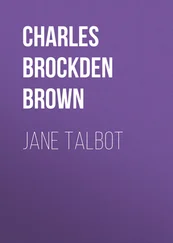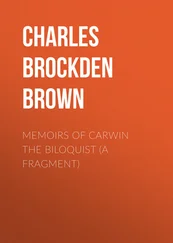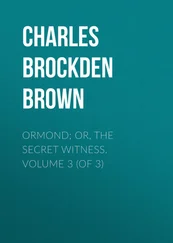Charles Brown - Edgar Huntly; or, Memoirs of a Sleep-Walker
Здесь есть возможность читать онлайн «Charles Brown - Edgar Huntly; or, Memoirs of a Sleep-Walker» — ознакомительный отрывок электронной книги совершенно бесплатно, а после прочтения отрывка купить полную версию. В некоторых случаях можно слушать аудио, скачать через торрент в формате fb2 и присутствует краткое содержание. Жанр: foreign_prose, foreign_antique, на английском языке. Описание произведения, (предисловие) а так же отзывы посетителей доступны на портале библиотеки ЛибКат.
- Название:Edgar Huntly; or, Memoirs of a Sleep-Walker
- Автор:
- Жанр:
- Год:неизвестен
- ISBN:нет данных
- Рейтинг книги:4 / 5. Голосов: 1
-
Избранное:Добавить в избранное
- Отзывы:
-
Ваша оценка:
- 80
- 1
- 2
- 3
- 4
- 5
Edgar Huntly; or, Memoirs of a Sleep-Walker: краткое содержание, описание и аннотация
Предлагаем к чтению аннотацию, описание, краткое содержание или предисловие (зависит от того, что написал сам автор книги «Edgar Huntly; or, Memoirs of a Sleep-Walker»). Если вы не нашли необходимую информацию о книге — напишите в комментариях, мы постараемся отыскать её.
Edgar Huntly; or, Memoirs of a Sleep-Walker — читать онлайн ознакомительный отрывок
Ниже представлен текст книги, разбитый по страницам. Система сохранения места последней прочитанной страницы, позволяет с удобством читать онлайн бесплатно книгу «Edgar Huntly; or, Memoirs of a Sleep-Walker», без необходимости каждый раз заново искать на чём Вы остановились. Поставьте закладку, и сможете в любой момент перейти на страницу, на которой закончили чтение.
Интервал:
Закладка:
Ambrose, in his tedious and confused way, related that, soon after Clithero and he had become bedfellows, the former was considerably disturbed by restlessness and talking in his sleep. His discourse was incoherent. It was generally in the tone of expostulation, and appeared to be entreating to be saved from some great injury. Such phrases as these,–"have pity;" "have mercy," were frequently intermingled with groans, and accompanied with weeping. Sometimes he seemed to be holding conferences with some one who was making him considerable offers on condition of his performing some dangerous service. What he said in his own person, and in answer to his imaginary tempter, testified the utmost reluctance.
Ambrose had no curiosity on the subject. As this interruption prevented him at first from sleeping, it was his custom to put an end to the dialogue, by awakening his companion, who betrayed tokens of great alarm and dejection on discovering how he had been employed. He would solicitously inquire what were the words that he had uttered; but Ambrose's report was seldom satisfactory, because he had attended to them but little, and because he grudged every moment in which he was deprived of his accustomed repose.
Whether Clithero had ceased from this practice, or habit had reconciled his companion to the sounds, they no longer occasioned any interruption to his slumber.
No one appeared more shocked than he at the death of Waldegrave. After this event his dejection suddenly increased. This symptom was observed by the family, but none but the housekeeper took the trouble to notice it to him, or build conjectures on the incident. During nights, however, Ambrose experienced a renewal of his ancient disturbances. He remarked that Clithero, one night, had disappeared from his side. Ambrose's range of reflection was extremely narrow. Quickly falling asleep, and finding his companion beside him when he awoke, he dismissed it from his mind.
On several ensuing nights he awakened in like manner, and always found his companion's place empty. The repetition of so strange an incident at length incited him to mention it to Clithero. The latter was confounded at this intelligence. He questioned Ambrose with great anxiety as to the particulars of this event, but he could gain no satisfaction from the stupid inattention of the other. From this time there was a visible augmentation of his sadness. His fits of taciturnity became more obstinate, and a deeper gloom sat upon his brow.
There was one other circumstance, of particular importance, mentioned by the housekeeper. One evening some one on horseback stopped at this gate. He rattled at the gate, with an air of authority, in token of his desire that some one would come from the house. Miss Inglefield was employed in the kitchen, from a window of which she perceived who it was that made the signal. Clithero happened, at the same moment, to be employed near her. She, therefore, desired him to go and see whom the stranger wanted. He laid aside his work and went. The conference lasted above five minutes. The length of it excited in her a faint degree of surprise, inducing her to leave her employment and pay an unintermitted attention to the scene. There was nothing, however, but its duration that rendered it remarkable.
Clithero at length entered, and the traveller proceeded. The countenance of the former betrayed a degree of perturbation which she had never witnessed before. The muscles of his face were distorted and tremulous. He immediately sat down to his work, but he seemed, for some time, to have lost all power over his limbs. He struggled to avoid the sight of the lady, and his gestures, irresolute or misdirected, betokened the deepest dismay. After some time, he recovered, in some degree, his self-possession; but, while the object was viewed through a new medium, and the change existed only in the imagination of the observer, a change was certainly discovered.
These circumstances were related to me by Inglefield and corroborated by his housekeeper. One consequence inevitably flowed from them. The sleep-walker, he who had led me through so devious a tract, was no other than Clithero. There was, likewise, a strong relation between this person and him who stopped at the gate. What was the subject of discourse between them? In answer to Miss Inglefield's interrogatories, he merely said that the traveller inquired whither the road led which, at a small distance forward, struck out of the principal one. Considering the length of the interview, it was not likely that this was the only topic.
My determination to confer with him in private acquired new force from these reflections. Inglefield assented to my proposal. His own affairs would permit the absence of his servant for one day. I saw no necessity for delay, and immediately made my request to Clithero. I was fashioning an implement, I told him, with respect to which I could not wholly depend upon my own skill. I was acquainted with the dexterity of his contrivances, and the neatness of his workmanship. He readily consented to assist me on this occasion. Next day he came. Contrary to my expectation, he prepared to return home in the evening. I urged him to spend the night with us: but no; it was equally convenient, and more agreeable to him, to return.
I was not aware of this resolution. I might, indeed, have foreseen that, being conscious of his infirmity, he would desire to avoid the scrutiny of strangers. I was painfully disconcerted; but it occurred to me, that the best that could be done was to bear him company, and seize some opportunity, during this interval, of effecting my purpose. I told him, that, since he would not remain, I cared not if, for the sake of recreation, and of a much more momentous purpose, I went along with him. He tacitly, and without apparent reluctance, consented to my scheme, and, accordingly, we set off together. This was an awful crisis. The time had now come that was to dissipate my uncertainty. By what means should I introduce a topic so momentous and singular? I had been qualified by no experience for rightly conducting myself on so critical an emergency. My companion preserved a mournful and inviolable silence. He afforded me no opening by which I might reach the point in view. His demeanour was sedate, while I was almost disabled, by the confusion of my thoughts, to utter a word.
It was a dreadful charge that I was about to insinuate. I was to accuse my companion of nothing less than murder. I was to call upon him for an avowal of his guilt. I was to state the ground of my suspicions, and desire him to confute or confirm them. In doing this, I was principally stimulated by an ungovernable curiosity; yet, if I intended not the conferring of a benefit, I did not, at least, purpose the infliction of evil. I persuaded myself that I was able to exclude from my bosom all sanguinary or vengeful impulses; and that, whatever should be the issue of this conversation, my equanimity would be unsubdued.
I revolved various modes of introducing the topic by which my mind was engaged. I passed rapidly from one to another. None of them were sufficiently free from objection to allow me to adopt it. My perplexity became, every moment, more painful, and my ability to extricate myself, less.
In this state of uncertainty, so much time elapsed, that the elm at length appeared in sight. This object had somewhat of a mechanical influence upon me. I stopped short, and seized the arm of my companion. Till this moment, he appeared to have been engrossed by his own reflections, and not to have heeded those emotions which must have been sufficiently conspicuous in my looks.
This action recalled him from his reverie. The first idea that occurred to him, when he had noticed my behaviour, was, that I was assailed by some sudden indisposition.
"What is the matter?" said he, in a tone of anxiety: "are you not well?"
Читать дальшеИнтервал:
Закладка:
Похожие книги на «Edgar Huntly; or, Memoirs of a Sleep-Walker»
Представляем Вашему вниманию похожие книги на «Edgar Huntly; or, Memoirs of a Sleep-Walker» списком для выбора. Мы отобрали схожую по названию и смыслу литературу в надежде предоставить читателям больше вариантов отыскать новые, интересные, ещё непрочитанные произведения.
Обсуждение, отзывы о книге «Edgar Huntly; or, Memoirs of a Sleep-Walker» и просто собственные мнения читателей. Оставьте ваши комментарии, напишите, что Вы думаете о произведении, его смысле или главных героях. Укажите что конкретно понравилось, а что нет, и почему Вы так считаете.












